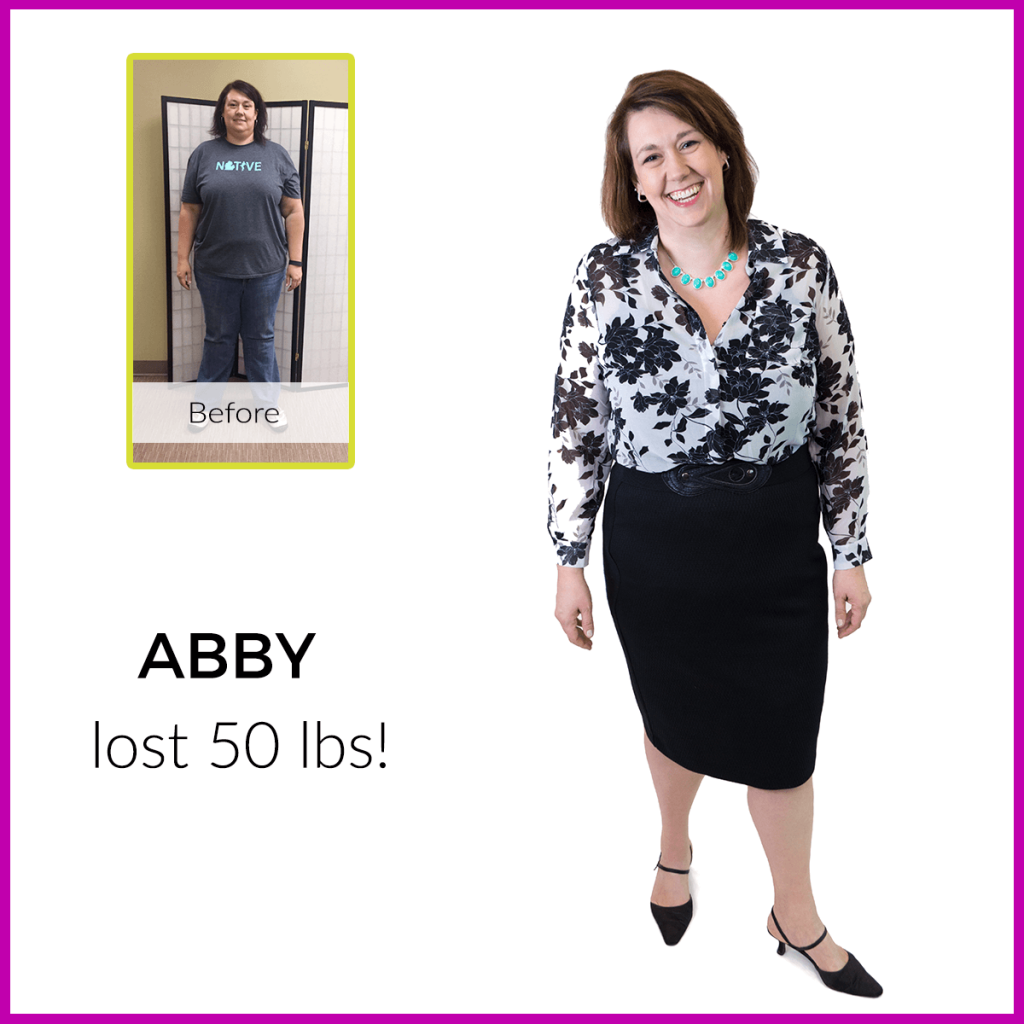68.8% of adults in the United States are considered either obese or overweight.1 Just think about that. As a result, weight loss is a very common thing that people struggle with, so if you are currently on that journey just know that you’re not alone. That is one of the reasons we are sharing people’s success stories – we want people to know that success is possible and that there are people right here in Dayton who have found success. We sat down and talked to Abigail about her experience with the HCG weight loss program with Horizons. So congratulations to Abby! Here are some of the things we talked about:

Tell me about your weight loss experience in the past:
I have struggled with weight my whole life and have tried lots of different things: Weight Watchers, Advocare, low-calorie/low-fat big fad diets that come out. And things work for a little while but nothing lasts long enough, or you think you’ve made it so far and say to yourself “Okay I’m good to go now; I can eat whatever I want or do whatever I want” and then that’s when the pounds start packing back on. I think life gets in the way too. Just getting married and having children you stop being the priority, as a mother.
How were the first 4 weeks of the HCG diet at Horizons?
I thought it was really nice because you saw the same people every week and even all the staff were cheering you on, noticing and saying “congratulations”, “good job”, and “you can do this.” So that was very helpful. It was difficult at first to really cut things out of your diet and out of your life, especially when you have kids running around, and life just gets busy. But I think the support and seeing Dr. Rowser every week to check in and talk to her and bounce ideas off – she was always readily available to answer those questions.
How is HCG different from other programs you’ve done in the past?
I think it really kinda rewires your brain. It makes you think about food and that it’s food to nourish your body and not to satisfy you, and not as a friend or something that is going to be there to support you. It makes you really pay attention to what’s out there, just foods that are produced and made, and what’s healthy and what’s not healthy. Also that you need to cook and think about things more than just the convenience of whatever is on the shelf I can grab. Now I have to think about what I’m grabbing or what I’m going to eat and cook. Before you’re just looking at things like, oh this is low-calorie/light, or this is low-fat or fat-free, but you’re not looking at what the contents are. What is it made out of? How much sugar is in it? How many carbs? Before you were just grabbing what was convenient, but now you have to stop and think about what fruits and vegetables you’ll need and what we are going to plan for meals. You have to think ahead. We have to be prepared so we’ll stay away from food or things that we eat just because they are convenient for us.
What were some challenges you encountered while on the program?
I think the challenge is raising a young family with children, because you’re still going to have some temptations in the house, but you have to work around them or know that they’re not going to be helpful to you. Or try to avoid things and come up with better ideas with the kids like different things for them to ask for, or different foods for them to try. I was having cravings and after talking with Dr. Rowser, there were other medications I could take to help me move through those cravings. A lot of it is just mental, it’s just trying to get past it, trying to get away from the things, like move away from the kitchen. Find something else to preoccupy yourself so you’re not thinking about the food. Chewing gum, drinking more water, just ideas of getting me out of the kitchen, getting me out of the food thought.
What are some helpful tips you learned along the way?
Meal planning and thinking ahead, so you have things available to cook so you’re not like, oh great we have nothing so we should go out , and then you’re going to be tempted to get things you’re not supposed to eat, so it’s the planning. Also the variety of using the internet for a place to find new recipes and new ideas. And don’t be afraid of new foods – the list of foods you can have is not to scare you, but will allow you to branch out and try different/new things.
How has HCG benefitted your life?
I sleep better. I have more energy with my kids, with my job. I don’t get so tired. I’m not as exhausted and crabby at the end of the day and don’t want to do things. I want to do things; activities with my kids. I want to be outside. I want to play. I think that just keeps the family time together better and that the kids see that difference and cheer you on too. So any encouragement we can get in any direction they understand that’s a good thing.
What would you tell someone contemplating HCG?
I’d be honest and say yeah there are going to be good days and there are going to be bad days, but that’s just life. That if this is something that you want to do then you’re going to have to give it everything you can, and if you’re not giving it 100% then you’re not going to see the result that you wanted. So you just need to be prepared for yourself, like mentally, to be ready to do this so that you know that it’s coming and that the payoff is going to be so much greater in the end.
1“Overweight and Obesity Statistics.” National Institutes of Health. U.S. Department of Health and Human Services, n.d. Web. 03 Mar. 2017.


